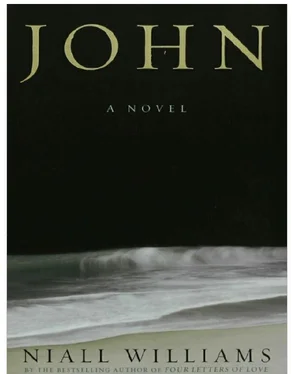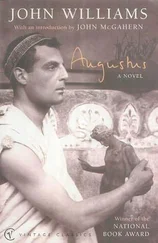Papias stops. His back is turned. Should he leave now? Should he deny Matthias another moment to spread his lies? His face is crimson. His hands shake.
'What proof?'
'I grieve to see you wounded, dear Papias. But wait, I will show.' Matthias leaves the room.
Papias is aware of his heart racing. Beneath his robe his flesh is awake, the creature of contagion crawling. He presses his hand hard against his chest, but it is not contained. With his nails he scratches deep.
'Here! Here, come, sit, Papias, and see.' Matthias is returned and holds in his hand a scrolled papyrus.
'What is it?'
'Come, sit, read for yourself.'
'What is it?' Papias asks again, as he takes the scroll.
Matthias wears a pained look as he delivers the blow.
'Dear Papias,' he says, 'good Papias, it is the true gospel of the apostle John.'
Papias sits without knowing he sits. His spirit is fallen. He holds the scroll opened before him. Matthias is beside him on the couch. He reaches to steady the young hand that shakes.
The scroll is ancient and wrinkled and frail. A delicate thing that has survived by miracle peril of sea and land, storm and fire. It is some part torn, some part stained by blood or wine or oil. Papias's heart is pierced to read it.
Here, in the Greek language, is written an account of the life and death of Jesus of Nazareth by one who was by his side. It tells of his meeting John the Baptist and of I, John, who followed him then. It tells of the wedding at Cana where Jesus taught the lesson that water should be considered wine, and by this meant our life on earth is water to the wine that is the world hereafter. It tells of his travels in Samaria with John and other disciples that grew so many until they could not be fed and turned angrily from him. Here is told that Jesus was a teacher and prophet, who spoke of God as the Father of all. 'But his message was mistaken by those who feared he was too favoured by the crowd. They told he called himself the Son of God that they might bring the law against him. This Jesus never said,' it is written. 'He was of us, a Gallilean. A man.'
Here, Papias lifts his head from the scroll. He finds his throat has closed and he cannot swallow. He finds his chest is constricted and will not allow air. He should put the scroll aside. He should read no more. But there is in the scripture a fierce hold. He is compelled by a sense of its authenticity. This is the truth, it seems to say, is the fact of what was. It is history and science only. There is nothing else.
The hand of Matthias lies over his own, the face is near enough for the sweet breath to feather against the disciple's cheek.
'Read more. Read all,' Matthias says.
Papias should not, but does. It is not true. This is not true.
But what if it is?
The larger portion of the gospel is an account of the capture, the scourging, the trial and crucifixion of Jesus. The writer spares no detail. Jesus is taken by Roman soldiers, who knock him to the ground and beat him though he does not resist. John stands back in fear. He follows when they drag the body off from the Place of Skulls. In a single phrase he tells of the trial, then moves to his main subject, the torturing of the body. Here is told each cut, each wound that opens in the face and body of Jesus. The writer glories in it. Jesus falls and is beaten. The dust clings to his wounds. Others on the route take turns to throw stones, pots, what comes to hand. The writer John tries to intervene but is driven back. Jesus is lashed. Jesus is stabbed between his shoulder blades with a knife and cries out.
Papias pushes the scroll back from him.
'It is sad, I know,' Matthias says softly. 'My heart was moved, too. The brute facts of it.' He pats Papias's hand. 'Who would not feel sympathy for such a man?' Matthias turns his face fully to the disciple; his eye wound jumps minutely and he raises a hand to still it. 'But read, read on, good Papias. It is important. You will see.'
The attacks continue all the way to the hill of Calvary. The writer is skilled in horror. The flesh that is torn away, the fluids that leak to the dust, the thousand scourges, all depicted. Then the crucifixion. Nails being driven, a darkening sky. The body mounted on to the cross.
Then, as the gospel nears its end, toward the bottom of the scroll, this: 'The body of Jesus hung on the cross until dead. When the soldiers had gone, the body was taken down and borne from that place and buried in a tomb. But fearing the wrath of the people and that they might come to desecrate the body in the morning I, John, and others of his disciples, took Jesus from the tomb and buried him elsewhere that we alone might know the last place of the teacher, Jesus of Nazareth.'
Papias lets the scroll fall.
'An account of love,' Matthias says. 'Clearly this John loved this Jesus. An account of hatred. Clearly this John hated the Romans and those who did not share his love.' He moistens his lips, purses some words he would say next. He must choose carefully.
'Papias, dear friend Papias, this script is old. It was traded in the market by an ancient who had come out of Antioch. He had many other like scrolls, testaments of various sages; he had a gospel, too, of one Matthew.' Matthias wrinkles his nose a short sneer, but quickly sees the disciple is not ready for such. Not yet. 'But this testament of John, I enquired of. He said he had it of a woman who traded it for salted fish. Truly. She was herself old and ragged, he told. She was alone and wandering and half mad. She said she knew the mother of this Jesus of Nazareth and had an account of his living written by one who loved him.' Matthias moves closer still. His voice he drops to a whisper, 'One John who hanged himself thereafter in guilt and love and was buried in Judea.'
Papias cannot speak. He cannot rise and run out. He cannot make the time go backwards and unhear what has been said. The silver O that stands in the room wavers in the glass of his tears. All along his chest the blisters speak. He shudders. Matthias lays an arm across his shoulders.
'We must not blame ourselves for believing an old man. I believed, too, a long time until the light. Until the One. But you have been chosen, Papias. You were dead, remember, and I asked that you be brought back, and you were. You are the elect, as am I. We cannot deny our calling. This other is in our past, was a false way, a way of darkness, but you are come here to find the true.' Matthias presses the disciple close to him, but Papias shakes violently. He brings a hand up to claw at his chest. He scratches through his robe.
'Calm yourself, it is all right. Calm,' the voice whispers at his ear.
But the shaking worsens. His body burns. Such heat as rises he thinks must burst aflame. White sweat leaks from his face. He scratches again fiercely, and again, twists in the embrace that holds him.
'What is it, Papias? Calm yourself. I am here. You need fear nothing. You are in the company of love, dear Papias.'
That he might still the troubled disciple Matthias doubles his embrace. He holds the other, who shakes wildly as a tree in storm. His cheek he lays against the chest of Papias.
And here he sees, in the opening of the robe, the angry red contagion.
'What? What is on you?' Sharply Matthias pulls back. He stands.
White-faced, shuddering, in the violent throes of an inner struggle, Papias stares outwards.
An instant, then Matthias reaches and with both hands rips open the disciple's garment to reveal a torso covered entire in rash and blister, blood and crust and ooze. He cries out in revulsion, looks at the hands that have touched the disease. He spins back, staggers, calls for Auster, who comes at once and clasps his hand across his mouth.
'Get him out! Get him from here! He is unclean! He is cursed! He would not come to us, and so now is devoured. Get him out!'
Читать дальше










